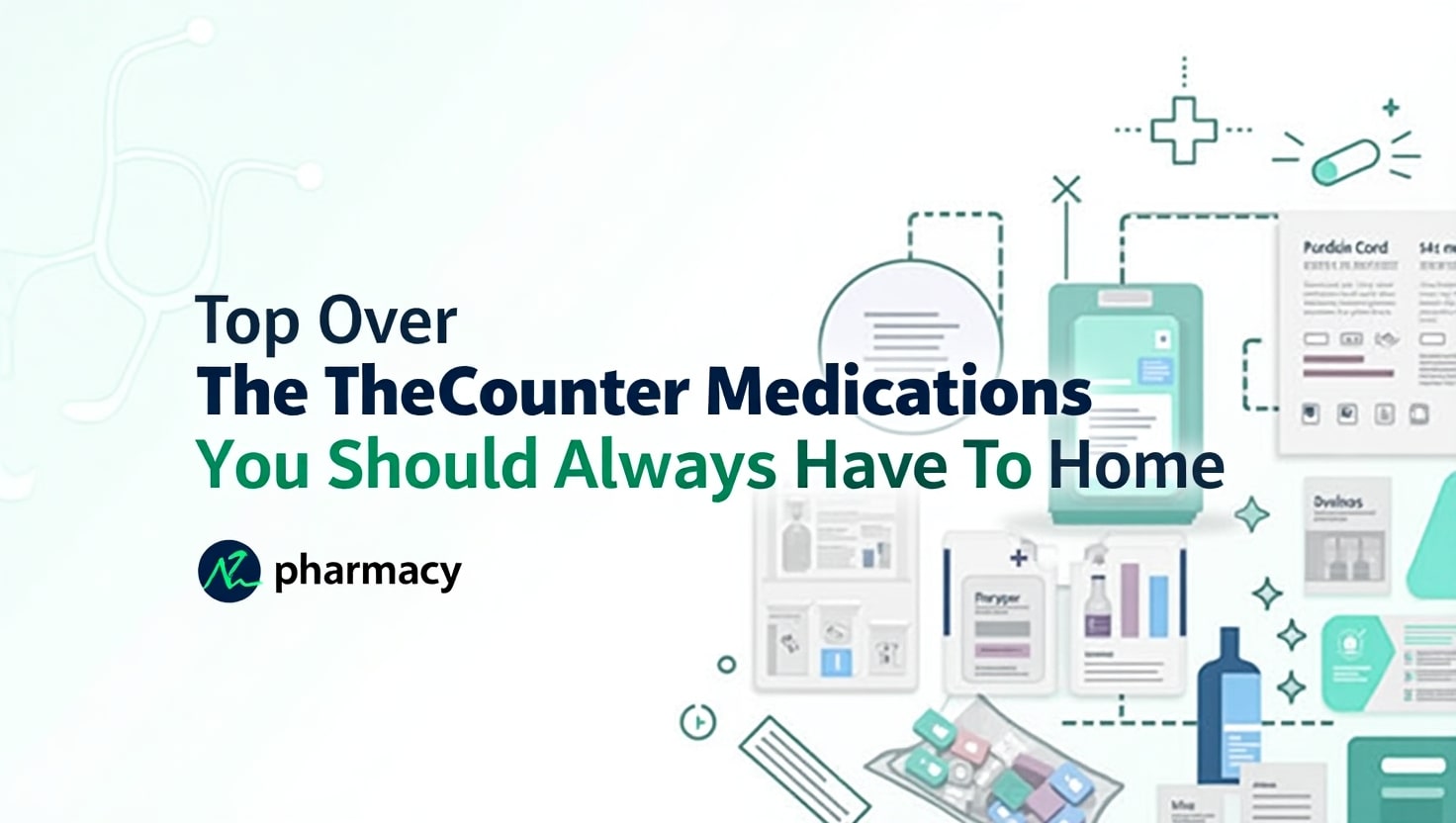Introduction: Your Home Pharmacy Arsenal
Imagine facing a sudden headache, a minor cut, or an unexpected allergic reaction—all without leaving the comfort of your home. Having a well-stocked arsenal of over-the-counter medications is not just convenient, it’s essential for handling everyday health hiccups. Whether it’s soothing a sore throat, easing stomach troubles, or treating minor wounds, these medications can make a world of difference. In this article, we’ll delve into the must-have over-the-counter medications that will ensure you’re always prepared for life’s little medical surprises.

Pain Relievers: Tackling Aches and Pains
Common Types of Pain Relievers
When it comes to managing everyday aches and pains, two over-the-counter medications stand out: Acetaminophen and Ibuprofen. Acetaminophen, known for its brand name Tylenol, is an effective option for reducing fever and alleviating mild to moderate pain. On the other hand, Ibuprofen, which you might recognize as Advil or Motrin, not only reduces pain and fever but also possesses anti-inflammatory properties.
Scenarios for Using Acetaminophen
Acetaminophen is your go-to choice for a wide range of situations. Whether you’re dealing with a persistent headache, a toothache, or the discomfort from a common cold, Acetaminophen can provide quick relief. It’s also a safe option for those who need a fever reducer, making it a staple in every household’s medicine cabinet.
When to Reach for Ibuprofen
For those moments when inflammation adds to your discomfort, Ibuprofen is your best ally. This medication is highly effective for treating muscle pain, sprains, or arthritis. It’s particularly useful after a strenuous workout or when dealing with menstrual cramps. The anti-inflammatory effects of Ibuprofen can significantly reduce swelling and pain, helping you get back to your daily routine more comfortably.
Absolutely, let’s dive deeper into these sections, giving them a more detailed and engaging explanation with a touch of expertise:
Cold and Flu Medications: Combat the Common Cold
Key Choices: Decongestants and Antihistamines
When the sniffles and sneezes of a cold or flu hit, having the right over-the-counter medications can make a significant difference. Decongestants like pseudoephedrine are essential for clearing up nasal congestion, allowing you to breathe easier. They work by narrowing the blood vessels in your nose, reducing swelling and congestion.
Antihistamines, on the other hand, are your go-to for tackling runny noses and sneezing. Medications like diphenhydramine and loratadine can help reduce these symptoms by blocking histamine, a substance in the body that causes allergic reactions.
Effective Use During Colds and Flu
Understanding when and how to use these medications is key to keeping yourself functioning during a cold or flu. Decongestants are best taken during the day when you need relief from stuffiness, while non-drowsy antihistamines can help you get through the day without being slowed down by a runny nose. For nighttime relief, drowsy antihistamines can help you rest better.
Digestive Aids: Smooth Sailing for Your Stomach
Essential for Digestive Issues: Antacids and Laxatives
Digestive discomfort can strike at the most inconvenient times, and having the right medications on hand can provide quick relief. Antacids like calcium carbonate are perfect for neutralizing stomach acid and relieving heartburn and indigestion. They work quickly to balance the stomach’s pH and provide comfort.
Laxatives, such as bisacodyl or fiber supplements, are essential for managing constipation. These medications help stimulate bowel movements or add bulk to your stool, making it easier to pass.
When to Use Them and How They Bring Relief
Antacids should be used when you feel the burning sensation of heartburn or after meals that you know might trigger indigestion. Laxatives should be taken according to the product instructions and only when necessary to relieve constipation, ensuring smooth digestive processes.
Allergy Medications: Guard Against Allergies
Must-Haves for Allergy Seasons: Antihistamines and Nasal Sprays
When allergy season rolls around, having a stock of effective medications can save you from a lot of discomfort. Antihistamines like cetirizine and fexofenadine are great for relieving sneezing, itching, and runny noses. They block the body’s histamine response to allergens, providing quick relief.
Nasal sprays, such as fluticasone or saline solutions, are excellent for reducing nasal inflammation and clearing nasal passages. They help maintain clear breathing and reduce symptoms like congestion.
Quick Relief and Prevention Tips
For best results, start taking antihistamines a few days before allergy season begins and use nasal sprays daily to keep symptoms at bay. Combining these medications can provide comprehensive relief, ensuring that you can enjoy the changing seasons without suffering from allergies.
Sure, let’s delve into these sections with more detail and make them as engaging and informative as possible:
Topical Ointments and Creams: First-Aid Heroes
Key Products: Antibiotic Ointments and Hydrocortisone Cream
In the realm of first-aid, topical ointments and creams are true heroes. Antibiotic ointments, such as Neosporin, are essential for preventing infections in minor cuts, scrapes, and burns. Applying an antibiotic ointment creates a barrier against bacteria, promoting faster healing.
Hydrocortisone cream is another must-have, particularly effective for reducing inflammation and itching caused by insect bites, rashes, and allergic reactions. This versatile cream can soothe a variety of skin irritations, making it an indispensable part of your home pharmacy.
Practical Uses for Cuts, Burns, and Skin Irritations
Topical ointments and creams are invaluable for treating minor injuries and skin conditions. For cuts and scrapes, clean the wound and apply antibiotic ointment to prevent infection. For burns, a thin layer of antibiotic ointment can help reduce pain and speed up healing. Hydrocortisone cream is perfect for calming down itchy rashes, eczema, and insect bites, providing quick relief from discomfort.
First Aid Supplies: Ready for Minor Emergencies
Crucial Items: Bandages and Antiseptics
No home pharmacy is complete without basic first aid supplies. Bandages of various sizes are crucial for covering wounds and preventing contamination. Whether it’s a small adhesive bandage for a minor cut or a larger bandage for a more significant injury, having a variety ensures you’re prepared.
Antiseptics, such as hydrogen peroxide or alcohol wipes, are essential for cleaning wounds before bandaging. They help prevent infections by killing bacteria and other pathogens on the skin’s surface.
Importance of Having Them Within Reach
Having first aid supplies readily available means you can quickly respond to minor injuries, reducing the risk of infection and promoting faster healing. It also provides peace of mind, knowing you’re prepared for any small accidents that may occur at home.
Miscellaneous Essentials: The Extra Lifesavers
Other Useful Over-the-Counter Items: Cough Drops and Sleep Aids
There are a few other over-the-counter items that can be real lifesavers in specific situations. Cough drops, like those containing menthol or honey, are great for soothing sore throats and suppressing coughs. They can provide immediate relief, making them a handy addition to your home pharmacy.
Sleep aids, such as melatonin or herbal teas, are useful for those occasional sleepless nights. They can help you relax and get the rest you need, especially during stressful times.
Additional Tips for Maintaining a Well-Stocked Home Pharmacy
To ensure your home pharmacy is always ready for any situation, regularly check the expiration dates on your medications and replace them as needed. Keep a list of essentials and make sure to replenish them after use. By maintaining a well-stocked and organized home pharmacy, you’ll be prepared to handle minor health issues quickly and effectively.
Conclusion
Having a well-stocked home pharmacy is not just about convenience; it’s about being prepared for life’s unexpected health challenges. From managing minor aches and pains with acetaminophen and ibuprofen to combating colds, flu, and allergies with the right medications, you can handle most everyday health issues right at home. Digestive aids, topical ointments, and first aid supplies are crucial for maintaining comfort and addressing minor injuries promptly. Don’t forget those miscellaneous essentials like cough drops and sleep aids, which can be real lifesavers in specific situations.
By keeping these over-the-counter medications on hand, you ensure that you’re always ready to provide immediate care and relief for yourself and your loved ones. Regularly updating your home pharmacy and knowing how and when to use these medications will keep you prepared and confident in managing minor health issues effectively.









